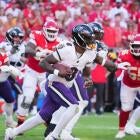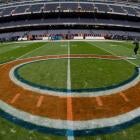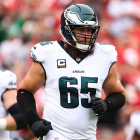Steelers vs. Broncos rivalry: Here's a look at their unique playoff history
Pittsburgh and Denver have had several epic playoff battles

The Steelers and Broncos, in the eyes of most NFL historians, are not considered classic rivals. They don't play each other that often, with the Broncos residing in the AFC West and the Steelers competing in the AFC North. In fact, the teams have only played each other 33 times, with the Broncos on the winning end 20 times.
While they don't play often, Pittsburgh and Denver are intertwined as far as playoff history is concerned. In fact, you can't tell the complete story of either franchise without mentioning the other. All told, the Steelers and Broncos have faced each other in the playoffs eight times, with the winner of that game going onto represent the AFC in the Super Bowl six times.
Before the two teams square off Sunday at Heinz Field, we decided to take a look at each of their playoff matchups, games that helped shape the history of not only the Steelers and Broncos franchises, but NFL history as well.
1977 divisional round: Broncos 34, Steelers 21
The Broncos, led by their "Orange Crush" defense, had their way with the Steelers, who appeared to be a team in decline after winning back-to-back Super Bowls earlier in the decade. And while the Steelers rallied to tie the score early in the fourth quarter, the Broncos responded with a pair of field goals by Jim Turner. Denver then put the game on ice following Craig Morton's touchdown pass to Jack Doblin. Morton threw two touchdowns against Pittsburgh's fabled "Steel Curtain" defense. Steelers quarterback Terry Bradshaw threw three interceptions, including two to Broncos linebacker Tom Jackson.
1978 divisional round: Steelers 33, Broncos 10
While Denver, the defending AFC champion, was able to make it back to the playoffs in 1978, it was no match for the Steelers, who took full advantage of the league's new rules favoring the offense. Bradshaw, that year's league MVP, threw fourth quarter touchdown passes to Lynn Swann and John Stallworth. The Steelers' defense, led by Hall of Famers Joe Greene, Jack Ham, Jack Lambert, Mel Blount, and Donnie Shell, registered six sacks while holding the Broncos to 218 total yards. The Steelers then dispatched Houston and Dallas to become the first franchise to win three Super Bowls.
This was the second playoff game for current Patriots coach Bill Belichick, who served as a Broncos special teams and defensive assistant during the '78 season.
December 30, 1978
— Old Time Football 🏈 (@Ol_TimeFootball) December 30, 2019
AFC Divisional Round #Broncos #Steelers
John Stallworth sets a playoff record with 10 catches (10-156-1)
Bradshaw 16-29-272-2-1
Weese 8-16-118
Morton 3-5-34 pic.twitter.com/B2UZC6Jxnk
1984 divisional round: Steelers 24, Broncos 17
John Elway's first playoff game serves as one of the most disappointing playoff losses in Broncos history. Fresh off of a 13-3 regular season, the Broncos fell at home to the Steelers, who squeaked into the playoffs with a 9-7 record. While Pittsburgh's defense sacked Elway four times while also picking him off twice, the Steelers' offense received a stellar effort from running backs Frank Pollard and Walter Abercrombie, who combined to amass 240 total yards and two touchdowns. Rookie Louis LIpps' 10-yard touchdown tied the score in the fourth quarter, while Pollard's second touchdown gave Pittsburgh the lead for good.
December 30, 1984
— Tomlin Reactions 🆃 (@TomlinReactions) December 24, 2018
The 10-6 #Steelers travel to Denver to take on the 13-3 Broncos.@LouisLipps83 ties the game on a 4th quarter pass from @malonesmic #HereWeGo pic.twitter.com/n8vcyCtsrv
1989 divisional round: Broncos 24, Steelers 23
Five years after their dramatic playoff upset in Denver, the Steelers (who upset the Oilers one week earlier in the wild card round) nearly did it again in the '89 playoffs, taking a 17-7 second quarter lead on touchdowns by Lipps and running back Merril Hoge, who ran for 120 yards while also catching eight passes for 60 yards.
Tryone Braxton's recovered fumble, followed by Elway's 37-yard touchdown pass to Vance Johnson, tied the score at the start of the second half. Pittsburgh responded with a pair of field goals before Elway led the Broncos on a game-winning drive that culminated with Mel Bratton's 1-yard touchdown. The Broncos would eventually clinch their third AFC title in four years, while the loss served as the final playoff game for Steelers Hall of Fame coach Chuck Noll.
1997 AFC Championship Game: Broncos 24, Steelers 21
A month after getting decisively beaten in Pittsburgh, the Broncos, who edged the top-seeded Chiefs in Arrowhead Stadium a week earlier, flipped the script in the '97 AFC Championship Game. After falling behind early, the Broncos, led by Terrell Davis' 139 rushing yards and a defense that forced three Kordell Stewart interceptions, led by 10 points heading into the fourth quarter. But after Pittsburgh pulled to within a field goal on Stewart's 14-yard touchdown pass to Charles Johnson, the Broncos faced a crucial third and six situation with two minutes left. Elway, who still in pursuit of his first Super Bowl title, punched his fourth ticket to the Super Bowl after completing the game-clinching pass to Shannon Sharpe. Denver would then upset the Packers to become the first AFC team to win the Super Bowl since the '83 Raiders.
After 60 Broncos seasons, an appreciation:
— Broncos Outsider (@BroncosOutside) January 22, 2020
My favorite playoff wins, counted down:
#13
January 11, 1998. AFCCG. On one of the most important 3rd downs in Broncos history, Elway rockets the ball to Sharpe to beat the Steelers 24-21 to advance to the SB!#BroncosCountry pic.twitter.com/kbT9ZyIo0h
2005 AFC Championship Game: Steelers 34, Broncos 17
Eight years after suffering a bitter playoff loss at the hands of the Broncos, Jerome Bettis was on the other side of history on Jan. 22, 2006. A week after shocking Peyton Manning and the rest of the the top-seeded Colts, Bettis and the Steelers pulled off another upset in Denver, as Ben Roethlisberger's three touchdowns helped punch Pittsburgh's Super Bowl ticket. The Steelers' defense, led by Hall of Fame safety Troy Polamalu, also played a signifiant role in the win, forcing four turnovers that included two interceptions of Broncos quarterback Jake Plummer. The Steelers would go onto become the first NFL team to win the Super Bowl as a sixth seed.
Ben Roethlisberger gives the guns in the 2005 AFC Championship game against the Broncos #Steelers pic.twitter.com/udRZ2IY2An
— BlitzburghUSAVideos (@sdextrasmedia) January 19, 2020
2011 wild card: Broncos 29, Steelers 23 (OT)
Despite winning 12 regular season games, the Steelers were the visiting team for this playoff game after losing the AFC North division title to the 13-3 Ravens. After forcing Pittsburgh to settle for field goals early, the Broncos, who won the AFC West that season despite posting a .500 record, took a 20-6 halftime lead on the strength of two Tim Tebow touchdown passes. Roethlisberger rallied the Steelers to a late game-tying score before Tebow hit Demaryius Thomas for an 80-yard touchdown on the first play of overtime. The win capped off a magical year for Tebow, who engineered several game-winning drives throughout the course of the 2011 season.
On this date 8 years ago:
— CBS Sports (@CBSSports) January 8, 2020
Tim Tebow threw an 80-yard TD pass to Demaryius Thomas in the AFC wildcard game to shock the Steelers in overtime. pic.twitter.com/tJqwGiDjnH
2015 divisional round: Broncos 23, Steelers 16
Despite having Le'Veon Bell, Antonio Brown and DeAngelo Williams sidelined with injuries, the underdog Steelers, led by Martavis Bryant's 194 all-purpose yards, led 13-9 and where threatening to add to their lead at the start of the fourth quarter. The complexion of the game changed when DeMarcus Ware recovered a fumble by Pittsburgh running back Fitzgerald Toussaint deep in Denver territory. Less than six minutes after Toussaint's fumble, the Broncos took the lead for good on C.J. Anderson's 1-yard touchdown run. Denver's defense, the best in football that season, then came up with two big stops while preserving the win.
The Broncos would then defeat the Patriots before upsetting the Panthers in Super Bowl 50, which would serve as the final game of Peyton Manning's Hall of Fame career.


















